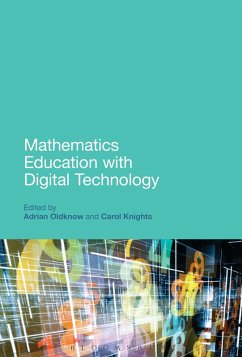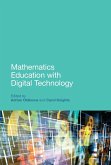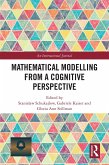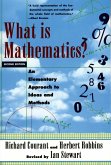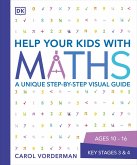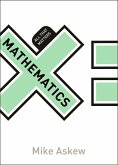Adrian Oldknow
Mathematics Education with Digital Technology (eBook, ePUB)
Redaktion: Oldknow, Adrian; Knights, Carol
32,95 €
inkl. MwSt.
Sofort per Download lieferbar

16 °P sammeln
Adrian Oldknow
Mathematics Education with Digital Technology (eBook, ePUB)
Redaktion: Oldknow, Adrian; Knights, Carol
- Format: ePub
- Merkliste
- Auf die Merkliste
- Bewerten Bewerten
- Teilen
- Produkt teilen
- Produkterinnerung
- Produkterinnerung

Bitte loggen Sie sich zunächst in Ihr Kundenkonto ein oder registrieren Sie sich bei
bücher.de, um das eBook-Abo tolino select nutzen zu können.
Hier können Sie sich einloggen
Hier können Sie sich einloggen
Sie sind bereits eingeloggt. Klicken Sie auf 2. tolino select Abo, um fortzufahren.

Bitte loggen Sie sich zunächst in Ihr Kundenkonto ein oder registrieren Sie sich bei bücher.de, um das eBook-Abo tolino select nutzen zu können.
Mathematics Education with Digital Technology examines ways in which widely available digital technologies can be used to benefit the teaching and learning of mathematics. The contributors offer their insights to locate the value of digital technology for mathematics learning within the context of evidence from documented practice, prior research and of educational policy making. Key pedagogical uses of digital technologies are evaluated in relation to effective mathematics learning and practical ideas for teaching and learning mathematics with digital technology are critically analysed. The…mehr
- Geräte: eReader
- mit Kopierschutz
- eBook Hilfe
- Größe: 2.5MB
Andere Kunden interessierten sich auch für
![Mathematics Education with Digital Technology (eBook, PDF) Mathematics Education with Digital Technology (eBook, PDF)]() Adrian OldknowMathematics Education with Digital Technology (eBook, PDF)32,95 €
Adrian OldknowMathematics Education with Digital Technology (eBook, PDF)32,95 €![Mathematical Modelling from a Cognitive Perspective (eBook, ePUB) Mathematical Modelling from a Cognitive Perspective (eBook, ePUB)]() Mathematical Modelling from a Cognitive Perspective (eBook, ePUB)55,95 €
Mathematical Modelling from a Cognitive Perspective (eBook, ePUB)55,95 €![Why Study Mathematics? (eBook, ePUB) Why Study Mathematics? (eBook, ePUB)]() Vicky NealeWhy Study Mathematics? (eBook, ePUB)11,95 €
Vicky NealeWhy Study Mathematics? (eBook, ePUB)11,95 €![What Is Mathematics? (eBook, ePUB) What Is Mathematics? (eBook, ePUB)]() Courant, Richard, the lateWhat Is Mathematics? (eBook, ePUB)10,95 €
Courant, Richard, the lateWhat Is Mathematics? (eBook, ePUB)10,95 €![Jonglieren in Schulen (eBook, ePUB) Jonglieren in Schulen (eBook, ePUB)]() Stephan EhlersJonglieren in Schulen (eBook, ePUB)25,99 €
Stephan EhlersJonglieren in Schulen (eBook, ePUB)25,99 €![Help Your Kids with Maths, Ages 10-16 (Key Stages 3-4) (eBook, ePUB) Help Your Kids with Maths, Ages 10-16 (Key Stages 3-4) (eBook, ePUB)]() Carol VordermanHelp Your Kids with Maths, Ages 10-16 (Key Stages 3-4) (eBook, ePUB)7,99 €
Carol VordermanHelp Your Kids with Maths, Ages 10-16 (Key Stages 3-4) (eBook, ePUB)7,99 €![Mathematics: All That Matters (eBook, ePUB) Mathematics: All That Matters (eBook, ePUB)]() Mike AskewMathematics: All That Matters (eBook, ePUB)3,99 €
Mike AskewMathematics: All That Matters (eBook, ePUB)3,99 €-
-
-
Mathematics Education with Digital Technology examines ways in which widely available digital technologies can be used to benefit the teaching and learning of mathematics. The contributors offer their insights to locate the value of digital technology for mathematics learning within the context of evidence from documented practice, prior research and of educational policy making. Key pedagogical uses of digital technologies are evaluated in relation to effective mathematics learning and practical ideas for teaching and learning mathematics with digital technology are critically analysed. The volume concludes by looking at future developments and by considering the ways in which ICT could be used as a catalyst for cross-curricular work to achieve greater curricular coherence.
Produktdetails
- Produktdetails
- Verlag: Bloomsbury eBooks UK
- Seitenzahl: 304
- Erscheinungstermin: 2. Juni 2011
- Englisch
- ISBN-13: 9781441129857
- Artikelnr.: 38299109
- Verlag: Bloomsbury eBooks UK
- Seitenzahl: 304
- Erscheinungstermin: 2. Juni 2011
- Englisch
- ISBN-13: 9781441129857
- Artikelnr.: 38299109
- Herstellerkennzeichnung Die Herstellerinformationen sind derzeit nicht verfügbar.
Adrian Oldknow is Professor Emeritus at the University of Chichester, UK.
Notes on Contributors
Series Editor's Foreword
Acknowledgements
Introduction
Part 1: Where Are We Now?
1. The NeuroScience of Connections, Generalizations, Visualizations and
Meaning Edward D. Laughbaum
2. ICT in the United States: Where We Are Today and a Possibility for
Tomorrow Gail Burrill
3. ICT in France: Development of Usages, Institutional Hesitations and
Research Questions Luc Trouche and Ghislaine Gueudet
4. ICT and the English Mathematics Curriculum Sue Pope
Part 2: What Does Research Tell Us?
5. The Value of Learning Geometry with ICT: Lessons from Innovative
Educational Research Keith Jones
6. Learning Mathematics Using Digital Resources: Impacts on Learning and
Teaching for 11- to 14-year old Pupils Don Passey
7. Improving on Expectations: Preliminary Results from Using
Network-supported Function-based Algebra Walter Stroup, Lupita Carmona and
Sarah M. Davis
Part 3: Key Pedagogical Issues in Embedding ICT in Teaching and Learning
Mathematics
8. Designing Substantial Tasks to Utilize ICT in Mathematics Lessons
Colette Laborde
9. Learning from Acting on Objects John Mason
10. A Case Study of Using Multiple Resources to Teach Straight Line Graphs
Rosemary Deaney and Sarah Hennessy
Part 4: Description of a Range of ICT Tools
11. Emerging Technologies for Learning and Teaching Vanessa Pittard
12. Home and School - Bridging the Gap Russell Prue
13. Personal Portable Technology Adrian Oldknow and Peter Hamilton
Part 5: Practical Ideas of ICT to Enhance Teaching and Learning
14. Linking the Mathematics Curriculum to Software, Resources and
Strategies to Engage Teachers and Learners in Using ICT in the Classroom
Linda Tetlow
15. The Uses of Online Resources for Teaching and Learning Mathematics at
Advanced Level Bryan Dye
16. What Do the Subject Associations Offer? Ruth Tanner
17. Modelling, Functions and Estimation: A Pizza Problem Chris Olley
Part 6: ICT Supporting Cross-curricular Work with Mathematics
18. Using Video Analysis to Develop Modelling Skills in Physics Steve Hearn
19. Bloodhound SSC: A Vehicle for STEM Ian Galloway
20. Modelling Action in Sports and Leisure Matt Pauling and Adrian Oldknow
Part 7: Case Studies of Teachers Engaging with ICT
21. Teaching International Baccalaureate Mathematics with Technology Jim
Fensom
22. Why Use Technology to Teach Mathematics? Andy Kemp
23. Using ICT to Support Learning Mathematics in the Primary Classroom Mel
Bradford and Tina Davidson
24. The Role of a Head of Mathematics Department in Ensuring ICT Provision
and Use within Lessons Dawn Denyer and Carol Knights
25. Developing Problem Solving Skills and Cross-curricular Approaches in
Mathematics Utilizing ICT Michael Hartnell and Carol Knights
Part 8: Implications for Professional Development
26. Supporting Developments within a Local Authority Ron Taylor
27. Supporting Teachers in Introducing New Technologies Alison Clark-Wilson
28. Implications for Professional Development: Supporting Individuals Pip
Huyton
29. What Are the Significant Factors Which Support the Integration of ICT
in the Mathematics Classroom? David Wright and Pat Woolner
Glossary
Index
Series Editor's Foreword
Acknowledgements
Introduction
Part 1: Where Are We Now?
1. The NeuroScience of Connections, Generalizations, Visualizations and
Meaning Edward D. Laughbaum
2. ICT in the United States: Where We Are Today and a Possibility for
Tomorrow Gail Burrill
3. ICT in France: Development of Usages, Institutional Hesitations and
Research Questions Luc Trouche and Ghislaine Gueudet
4. ICT and the English Mathematics Curriculum Sue Pope
Part 2: What Does Research Tell Us?
5. The Value of Learning Geometry with ICT: Lessons from Innovative
Educational Research Keith Jones
6. Learning Mathematics Using Digital Resources: Impacts on Learning and
Teaching for 11- to 14-year old Pupils Don Passey
7. Improving on Expectations: Preliminary Results from Using
Network-supported Function-based Algebra Walter Stroup, Lupita Carmona and
Sarah M. Davis
Part 3: Key Pedagogical Issues in Embedding ICT in Teaching and Learning
Mathematics
8. Designing Substantial Tasks to Utilize ICT in Mathematics Lessons
Colette Laborde
9. Learning from Acting on Objects John Mason
10. A Case Study of Using Multiple Resources to Teach Straight Line Graphs
Rosemary Deaney and Sarah Hennessy
Part 4: Description of a Range of ICT Tools
11. Emerging Technologies for Learning and Teaching Vanessa Pittard
12. Home and School - Bridging the Gap Russell Prue
13. Personal Portable Technology Adrian Oldknow and Peter Hamilton
Part 5: Practical Ideas of ICT to Enhance Teaching and Learning
14. Linking the Mathematics Curriculum to Software, Resources and
Strategies to Engage Teachers and Learners in Using ICT in the Classroom
Linda Tetlow
15. The Uses of Online Resources for Teaching and Learning Mathematics at
Advanced Level Bryan Dye
16. What Do the Subject Associations Offer? Ruth Tanner
17. Modelling, Functions and Estimation: A Pizza Problem Chris Olley
Part 6: ICT Supporting Cross-curricular Work with Mathematics
18. Using Video Analysis to Develop Modelling Skills in Physics Steve Hearn
19. Bloodhound SSC: A Vehicle for STEM Ian Galloway
20. Modelling Action in Sports and Leisure Matt Pauling and Adrian Oldknow
Part 7: Case Studies of Teachers Engaging with ICT
21. Teaching International Baccalaureate Mathematics with Technology Jim
Fensom
22. Why Use Technology to Teach Mathematics? Andy Kemp
23. Using ICT to Support Learning Mathematics in the Primary Classroom Mel
Bradford and Tina Davidson
24. The Role of a Head of Mathematics Department in Ensuring ICT Provision
and Use within Lessons Dawn Denyer and Carol Knights
25. Developing Problem Solving Skills and Cross-curricular Approaches in
Mathematics Utilizing ICT Michael Hartnell and Carol Knights
Part 8: Implications for Professional Development
26. Supporting Developments within a Local Authority Ron Taylor
27. Supporting Teachers in Introducing New Technologies Alison Clark-Wilson
28. Implications for Professional Development: Supporting Individuals Pip
Huyton
29. What Are the Significant Factors Which Support the Integration of ICT
in the Mathematics Classroom? David Wright and Pat Woolner
Glossary
Index
Notes on Contributors
Series Editor's Foreword
Acknowledgements
Introduction
Part 1: Where Are We Now?
1. The NeuroScience of Connections, Generalizations, Visualizations and
Meaning Edward D. Laughbaum
2. ICT in the United States: Where We Are Today and a Possibility for
Tomorrow Gail Burrill
3. ICT in France: Development of Usages, Institutional Hesitations and
Research Questions Luc Trouche and Ghislaine Gueudet
4. ICT and the English Mathematics Curriculum Sue Pope
Part 2: What Does Research Tell Us?
5. The Value of Learning Geometry with ICT: Lessons from Innovative
Educational Research Keith Jones
6. Learning Mathematics Using Digital Resources: Impacts on Learning and
Teaching for 11- to 14-year old Pupils Don Passey
7. Improving on Expectations: Preliminary Results from Using
Network-supported Function-based Algebra Walter Stroup, Lupita Carmona and
Sarah M. Davis
Part 3: Key Pedagogical Issues in Embedding ICT in Teaching and Learning
Mathematics
8. Designing Substantial Tasks to Utilize ICT in Mathematics Lessons
Colette Laborde
9. Learning from Acting on Objects John Mason
10. A Case Study of Using Multiple Resources to Teach Straight Line Graphs
Rosemary Deaney and Sarah Hennessy
Part 4: Description of a Range of ICT Tools
11. Emerging Technologies for Learning and Teaching Vanessa Pittard
12. Home and School - Bridging the Gap Russell Prue
13. Personal Portable Technology Adrian Oldknow and Peter Hamilton
Part 5: Practical Ideas of ICT to Enhance Teaching and Learning
14. Linking the Mathematics Curriculum to Software, Resources and
Strategies to Engage Teachers and Learners in Using ICT in the Classroom
Linda Tetlow
15. The Uses of Online Resources for Teaching and Learning Mathematics at
Advanced Level Bryan Dye
16. What Do the Subject Associations Offer? Ruth Tanner
17. Modelling, Functions and Estimation: A Pizza Problem Chris Olley
Part 6: ICT Supporting Cross-curricular Work with Mathematics
18. Using Video Analysis to Develop Modelling Skills in Physics Steve Hearn
19. Bloodhound SSC: A Vehicle for STEM Ian Galloway
20. Modelling Action in Sports and Leisure Matt Pauling and Adrian Oldknow
Part 7: Case Studies of Teachers Engaging with ICT
21. Teaching International Baccalaureate Mathematics with Technology Jim
Fensom
22. Why Use Technology to Teach Mathematics? Andy Kemp
23. Using ICT to Support Learning Mathematics in the Primary Classroom Mel
Bradford and Tina Davidson
24. The Role of a Head of Mathematics Department in Ensuring ICT Provision
and Use within Lessons Dawn Denyer and Carol Knights
25. Developing Problem Solving Skills and Cross-curricular Approaches in
Mathematics Utilizing ICT Michael Hartnell and Carol Knights
Part 8: Implications for Professional Development
26. Supporting Developments within a Local Authority Ron Taylor
27. Supporting Teachers in Introducing New Technologies Alison Clark-Wilson
28. Implications for Professional Development: Supporting Individuals Pip
Huyton
29. What Are the Significant Factors Which Support the Integration of ICT
in the Mathematics Classroom? David Wright and Pat Woolner
Glossary
Index
Series Editor's Foreword
Acknowledgements
Introduction
Part 1: Where Are We Now?
1. The NeuroScience of Connections, Generalizations, Visualizations and
Meaning Edward D. Laughbaum
2. ICT in the United States: Where We Are Today and a Possibility for
Tomorrow Gail Burrill
3. ICT in France: Development of Usages, Institutional Hesitations and
Research Questions Luc Trouche and Ghislaine Gueudet
4. ICT and the English Mathematics Curriculum Sue Pope
Part 2: What Does Research Tell Us?
5. The Value of Learning Geometry with ICT: Lessons from Innovative
Educational Research Keith Jones
6. Learning Mathematics Using Digital Resources: Impacts on Learning and
Teaching for 11- to 14-year old Pupils Don Passey
7. Improving on Expectations: Preliminary Results from Using
Network-supported Function-based Algebra Walter Stroup, Lupita Carmona and
Sarah M. Davis
Part 3: Key Pedagogical Issues in Embedding ICT in Teaching and Learning
Mathematics
8. Designing Substantial Tasks to Utilize ICT in Mathematics Lessons
Colette Laborde
9. Learning from Acting on Objects John Mason
10. A Case Study of Using Multiple Resources to Teach Straight Line Graphs
Rosemary Deaney and Sarah Hennessy
Part 4: Description of a Range of ICT Tools
11. Emerging Technologies for Learning and Teaching Vanessa Pittard
12. Home and School - Bridging the Gap Russell Prue
13. Personal Portable Technology Adrian Oldknow and Peter Hamilton
Part 5: Practical Ideas of ICT to Enhance Teaching and Learning
14. Linking the Mathematics Curriculum to Software, Resources and
Strategies to Engage Teachers and Learners in Using ICT in the Classroom
Linda Tetlow
15. The Uses of Online Resources for Teaching and Learning Mathematics at
Advanced Level Bryan Dye
16. What Do the Subject Associations Offer? Ruth Tanner
17. Modelling, Functions and Estimation: A Pizza Problem Chris Olley
Part 6: ICT Supporting Cross-curricular Work with Mathematics
18. Using Video Analysis to Develop Modelling Skills in Physics Steve Hearn
19. Bloodhound SSC: A Vehicle for STEM Ian Galloway
20. Modelling Action in Sports and Leisure Matt Pauling and Adrian Oldknow
Part 7: Case Studies of Teachers Engaging with ICT
21. Teaching International Baccalaureate Mathematics with Technology Jim
Fensom
22. Why Use Technology to Teach Mathematics? Andy Kemp
23. Using ICT to Support Learning Mathematics in the Primary Classroom Mel
Bradford and Tina Davidson
24. The Role of a Head of Mathematics Department in Ensuring ICT Provision
and Use within Lessons Dawn Denyer and Carol Knights
25. Developing Problem Solving Skills and Cross-curricular Approaches in
Mathematics Utilizing ICT Michael Hartnell and Carol Knights
Part 8: Implications for Professional Development
26. Supporting Developments within a Local Authority Ron Taylor
27. Supporting Teachers in Introducing New Technologies Alison Clark-Wilson
28. Implications for Professional Development: Supporting Individuals Pip
Huyton
29. What Are the Significant Factors Which Support the Integration of ICT
in the Mathematics Classroom? David Wright and Pat Woolner
Glossary
Index
